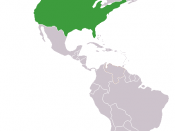In the novel Tree of Red Stars by Tessa Bridal, there are many references to the United States. These references are usually made to show the differences between the two countries. Geographic location is not the only thing that differentiates between Uruguay and the United States. Education, politics and the role of males are also major differences between the two countries.
There are many differences between the American and Uruguayan ways of education. We discover the majority of these during Magda's stay in the United States as an exchange student. "I [Magda] found high school difficult to adjust. Methods of teaching were different, and the material was elementary"ÃÂ (159). Magda also found school easier in the United States because of the difference in the time requirements. "In Uruguay, school was a full-time work, five and a half days a week, with several hours of homework every night, and summer school if we failed a final exam.
There were no electives, except for sports, and we worked too hard at our studies to do much else, eve if part-time jobs had been available."ÃÂ (Bridal, p 161) The American students also seem freer. They are allowed to date and go out alone.
The atmosphere of the schools was another thing Madga really noticed. "The first thing that struck me about my fellow students was their passivity. They sat politely, more concerned it seemed to me about their appearance and social life than about their studies. The girls wore makeup and sported hairdos that must have taken hours to accomplish. One or two were planning weddings"ÃÂ (159). It seems as if the students do not acknowledge the happenings outside their own personal existence. This has a direct affect on the relation between politics and students.
Another thing that surprised Magdalena was the lack of politics in the learning environment and she loved it. "I [Magda] loved to study and longed to do it where strikes would not interfere with finals; where a student's political views were unknown to the teachers and could not influence grades; where, as Janet had told me, one could play in an orchestra, sing in a choir, act in a play"ÃÂ (162). In the United States, politics are not a part of a normal school day as they are in Uruguay. "I [Magda] explained that student strikes were a matter of almost monthly occurrence in Uruguay as, simply a matter of principle, we protested governmental policies on anything and everything, flexing our political muscle, writing slogans on city walls, marching by the hundreds, holding up traffic and defacing government property"ÃÂ (160). This shocks Janet. She also seems unimpressed and as if she is better than it.
Even though both countries pride themselves on their democratic ways, the people have different views of politics in each country at the time of the novel. At the time, in the United States, people trust the government and do not protest the government's decisions. This is can be seen is Janet, Magda's American Sister, as she discussed her country, "Some of us trust our government."ÃÂ She also added, "Until they do something to make us wonder, why worry about it?"ÃÂ (160) That something that makes them wonder is the Vietnam War. This war made Americans truly question and lose trust in their government. Meanwhile in Uruguay, Magda explains how her fellow students and herself protest and question everything the government does. She also explains how they do not have the right to vote; yet they still feel they have a voice. That alone is completely different from the view in the United States.
Revolution is one area of politics that seems to differ between the United States and Uruguay, with each country represented by the Janet and Magda, respectively. Janet feels that it is a good thing that the United States has not had a revolution since the civil war. Magda questions if this really is as good as Janet makes it out to be. Janet asks, "You think wars are good?"ÃÂ (159) Magda responds, "No, but revolutions can be. I wish nobody got killed during them, but rethinking the way we do things, no accepting what the government tells us, that is not a bad thing"ÃÂ (160).
The role of men play in society is another major difference between Uruguay and the United State. Males have always had an important impact on the culture of a country. Uruguay and the United States are no exception. Their role can be broken down into their family lives and the way they treat women..
The one major difference in the family life is the amount of time the men spend with their family. This is most evident in Magdalena and Emilia's letters to each other. In Emilia's letter she asks, "why are American fathers at home so much? I can never escape mine! He comes straight home from work and eats with us every night"æ!!!"à(165) Magda responded with, "So, does mine! I have seen more of my American dad in four months than of my own father in as many years. I don't think our fathers would know what to do with themselves at home. Mine doesn't even sleep there very often!"à(165) The reason for their fathers not being at home is partly due to their mistresses.
The incident with Francisca Arteaga and her husband Ruben shows how the men in the society have mistresses. A woman dressed in all black informed Francisca that she was Ruben's former whore and that he has left her for a younger woman. Even though this is the only instance that these mistresses are brought out into the open it is implied during the whole novel that this is the reason the men are not at home that much. In the United States, mistresses may be present but it is not as socially accepted or expected as it is in Uruguay.
The men of Uruguay also treat their women differently in another way. They flirt differently with women than they do in the United States. In Uruguay, it is commonplace for a woman to be walking down the street and have men compliment, flirt or whistle to the women. The tias could not believe that Miss Newman, an American, found these comments or "piropos"ÃÂ insulting. "She [Miss Newman] must understand that piopos are a compliment. She should be flattered to receive them"ÃÂ (36). Tia Aurora added to Magda's mother's comment, "She [Miss Newman] maintains that in Uruguay a woman can't walk down the street without every male out of diapers feeling it his God-given right to comment on her appearance. Without, of course, her having the right to reciprocate"ÃÂ (36). In the United States, this is all considered sexual harassment.
The male impression on culture, political views, and educational systems, are just a few of the differences between the United States and Uruguay. These differences make each country unique. The novel Tree of Red Stars uses a first person view of Magdalena to emphasize this differences and explain why their there.





